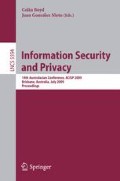Abstract
In previous RFID protocols, a hash-chain is used to achieve good privacy. Each tag is associated with a chain of Q hash values. To identify one tag out of a total of N tags, a server searches a table of size NQ. A naive search takes either Θ(NQ) time or Θ(NQ) memory, and therefore it does not scale well. A time-space tradeoff technique can mitigate the scalability problem. However, with the time-memory tradeoff, either time or space is still at least Θ((NQ)2/3).
In this paper, we propose a novel RFID protocol to solve the scalability problem. The server “solves”, instead of “searches”, for a tag ID. The protocol is based on polynomial operations, and its security and privacy is based on the difficulty of reconstructing a polynomial with noisy data. The protocol supports very large values of the product NQ. In our demo implementation where N = 232 and Q = 13700, the server takes 0.1 seconds and 10K bytes memory to identify a tag. As a comparison, a hash-chain based protocol enhanced with a time-memory tradeoff will require about 67 seconds and a 1G bytes memory.
Access this chapter
Tax calculation will be finalised at checkout
Purchases are for personal use only
Preview
Unable to display preview. Download preview PDF.
References
NTL: A library for doing number theory, http://www.shoup.net/ntl/
Avoine, G., Dysli, E., Oechslin, P.: Reducing time complexity in RFID systems. In: Preneel, B., Tavares, S.E. (eds.) SAC 2005. LNCS, vol. 3897, pp. 291–306. Springer, Heidelberg (2006)
Avoine, G., Oechslin, P.: A scalable and provably secure hash-based RFID protocol. In: PerCom Workshops, pp. 110–114. IEEE Computer Society, Los Alamitos (2005)
Berlekamp, E.R.: Factoring polynomials over finite fields. Bell Systems Technical Journal (46), 1853–1859 (1967)
Bleichenbacher, D., Nguyên, P.Q.: Noisy Polynomial Interpolation and Noisy Chinese Remaindering. In: Preneel, B. (ed.) EUROCRYPT 2000. LNCS, vol. 1807, pp. 53–69. Springer, Heidelberg (2000)
Cantor, D.G., Zassenhaus, H.: A new algorithm for factoring polynomials over finite fields. Math. Comp. 36(154), 587–592 (1981)
Courtois, N., Klimov, A., Patarin, J., Shamir, A.: Efficient Algorithms for Solving Overdefined Systems of Multivariate Polynomial Equations (2000)
Dimitriou, T.: A lightweight RFID protocol to protect against traceability and cloning attacks. In: SECURECOMM 2005: Proceedings of the First International Conference on Security and Privacy for Emerging Areas in Communications Networks, Washington, DC, USA, pp. 59–66. IEEE Computer Society, Los Alamitos (2005)
Fürbass, F., Wolkerstorfer, J.: ECC processor with low die size for RFID applications. In: ISCAS, pp. 1835–1838. IEEE Computer Society Press, Los Alamitos (2007)
Guruswami, V., Sudan, M.: Improved decoding of Reed-Solomon and algebraic-geometry codes. IEEE Transactions on Information Theory 45(6), 1757–1767 (1999)
Henrici, D., Müller, P.: Hash-based enhancement of location privacy for radio-frequency identification devices using varying identifiers. In: PerCom Workshops, pp. 149–153. IEEE Computer Society Press, Los Alamitos (2004)
Juels, A.: Minimalist cryptography for low-cost RFID Tags. In: Blundo, C., Cimato, S. (eds.) SCN 2004. LNCS, vol. 3352, pp. 149–164. Springer, Heidelberg (2005)
Juels, A.: RFID security and privacy: a research survey. IEEE Journal on Selected Areas in Communications 24(2), 381–394 (2006)
Kkiayias, A., Yung, M.: Directions in polynomial reconstruction based cryptography. IEICE Transactions on Fundamentals of Electronics, Communications and Computer E87-A(5), 978–985 (2004)
Kkiayias, A., Yung, M.: Cryptographic hardness based on the decoding of Reed-Solomon codes. IEEE Transactions on Information Theory 54(6) (2008)
Molnar, D., Wagner, D.: Privacy and security in library RFID: issues, practices, and architectures. In: CCS 2004: Proceedings of the 11th ACM conference on Computer and communications security, pp. 210–219. ACM Press, New York (2004)
Naor, M., Pinkas, B.: Oblivious transfer and polynomial evaluation. In: STOC 1999: Proceedings of the thirty-first annual ACM symposium on Theory of computing, pp. 245–254. ACM Press, New York (1999)
Naor, M., Pinkas, B.: Oblivious polynomial evaluation. SIAM J. Comput. 35(5), 1254–1281 (2006)
Ohkubo, M., Suzuki, K., Kinoshita, S.: Efficient hash-chain based RFID privacy protection scheme. In: International Conference on Ubiquitous Computing Ubicomp, Workshop Privacy: Current Status and Future Directions (2004)
Author information
Authors and Affiliations
Editor information
Editors and Affiliations
Rights and permissions
Copyright information
© 2009 Springer-Verlag Berlin Heidelberg
About this paper
Cite this paper
Wu, J., Stinson, D.R. (2009). A Highly Scalable RFID Authentication Protocol. In: Boyd, C., González Nieto, J. (eds) Information Security and Privacy. ACISP 2009. Lecture Notes in Computer Science, vol 5594. Springer, Berlin, Heidelberg. https://doi.org/10.1007/978-3-642-02620-1_25
Download citation
DOI: https://doi.org/10.1007/978-3-642-02620-1_25
Publisher Name: Springer, Berlin, Heidelberg
Print ISBN: 978-3-642-02619-5
Online ISBN: 978-3-642-02620-1
eBook Packages: Computer ScienceComputer Science (R0)

